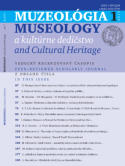Museum Collection Re-defined: A Case Study of TOGO Rural Art Museum, Taiwan
Museum Collection Re-defined: A Case Study of TOGO Rural Art Museum, Taiwan
Author(s): Lai Ying YingSubject(s): Museology & Heritage Studies, Management and complex organizations, Rural and urban sociology
Published by: Univerzita Komenského v Bratislave, Filozofická fakulta
Keywords: museum collection; museum management; regional museum; TOGO Rural Art Museum;
Summary/Abstract: The value of collections to museums is not merely in using them for display, research and promotion, but also in establishing communication with public, as well as in the construction of meaning through collection and interpretation of collections. Conventionally, museums consist of buildings, collections, experts, and public while others argue that museum should be better defined by territory, heritage, memory, and population. Museum should not limit itself inside the physical “building” of a museum but it should further expand to cover the whole territory. The scope of collections is also extended to reach both tangible and intangible “heritage” within this territory, including natural landscapes, geological features, historical sites, trade activities, etc. The meaning of such heritage exists in the local residents’ lives and memories and is shaped in a bottom up approach via collective participation by these residents. Museum collections are subject to constant re-interpretation by ever-changing groups of museum visitors and professionals, as well as by residents and staff members. The contexts in which collections are presented and viewed can fluctuate with time and place. This paper will take the TOGO Rural Art Museum in Taiwan as a case study to explore how museum collections can be re-defined and how museum collections are to make connections with people.
Journal: Muzeológia a kultúrne dedičstvo
- Issue Year: 7/2019
- Issue No: 1
- Page Range: 75-82
- Page Count: 8
- Language: English

